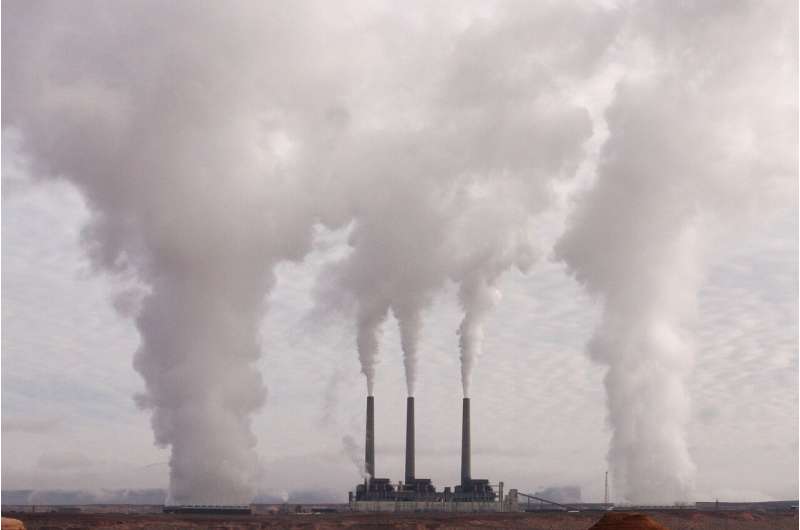This article has been reviewed according to Science X's editorial process and policies. Editors have highlighted the following attributes while ensuring the content's credibility:
fact-checked
reputable news agency
proofread
Supreme Court sounds skeptical of cross-state air pollution rule

Republican appointees to the Supreme Court criticized the EPA's rule on cross-state air pollution during oral arguments Wednesday, as the justices contemplate whether to block the rule as lower legal challenges play out.
Several of the conservative justices, who hold a 6-3 majority, questioned whether the agency should have considered how a plan that spans 23 states could change if litigation meant certain states would not be included.
The Environmental Protection Agency announced the plan last March as a national strategy to reduce air pollution that crosses state borders under the "good neighbor" provision of the Clean Air Act. Before that, the agency had rejected state-provided plans from each of the 23 in the program.
But many of the states covered by the EPA's national plan have challenged those rejections, and court rulings mean the agency's national plan currently covers only 11 of the original 23 states.
Justice Neil M. Gorsuch pointed out the agency had not explained, or given the public the chance to comment on, the effect of so few states participating in the plan. "Nobody got an opportunity to comment on that," Gorsuch said.
Justice Brett M. Kavanaugh pointed out that while the EPA's original plan said it would not change if states dropped out, it provided a "goose egg" for an explanation.
"They don't have an explanation here," Kavanaugh said.
The Supreme Court agreed to decide the issue after a series of emergency appeals last year from industry groups and three GOP-led states—Ohio, Indiana and West Virginia. They granted a rare oral argument on whether to pause the plan while the U.S. Court of Appeals for the District of Columbia Circuit considers the challenges.
The court's three Democratic appointees spent much of Wednesday's arguments questioning whether the Supreme Court should act on a rule challenge when no lower court has made a final ruling yet.
Justice Ketanji Brown Jackson said she could not see a difference between the arguments made by the states and industries opposing the rule and those made by any other challenge to a federal rule.
"I'm trying to understand what the emergency is that warrants Supreme Court intervention at this point," Jackson said.
The case comes to the court as the conservative majority has ruled against major administrative actions, particularly by the EPA, and the Republican-controlled House of Representatives has contemplated changing the agency's authority to pass standards under the Clean Air Act.
The rule requires 23 states to reduce emissions in power generation and other industries to help reduce smog and other air pollution in neighboring states. The plan covers much of the country, including California and several Western states and a large swath of the country from Texas to New York.
Mathura J. Sridharan, the Ohio solicitor general arguing for the three GOP-led states, told the justices that the EPA's plan doesn't consider how it would change because of states dropping out of the program.
"They failed to consider the most important aspect of the interdependence they introduced," Sridharan said.
The rule also established caps for power plants and other emissions sources, which could then be traded among each other.
Catherine E. Stetson, arguing for the industry groups opposed to the rule, said that industries may have to spend billions of dollars in the next 18 months to comply with the EPA's program when it has not actually said whether the pollution targets and trading program will work if so few states participate.
"There are fault lines throughout the agency order," Stetson said.
The Biden administration argued that the federal framework the EPA set up presupposed that states may be added or drop out of the plan.
Malcolm L. Stewart, deputy solicitor general, also pointed out that the "ground is still shifting" under the EPA as litigation over the rejection of state plans continues.
Stewart argued that because of how the program works, a court-ordered stay would effectively delay emission reductions for years even if the EPA won, hurting air quality in downwind states.
"That would delay the most stringent requirements to the detriment of the downwind states," Stewart said.
Judith N. Vale, New York's deputy solicitor general, said that pausing the plan would harm "downwind" states like Wisconsin, New York and Connecticut.
Power plants and other pollution generators in those states must meet EPA's overall clean air standards—efforts that are hampered by pollution from upwind states.
Vale said power plants and other polluters in her state and others have already done all the relatively low-cost work they can to reduce pollution, and the EPA plan would effectively get upwind polluters "into the middle of the pack of what downwind sources are already doing.
2024 CQ-Roll Call, Inc. Distributed by Tribune Content Agency, LLC.





















